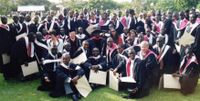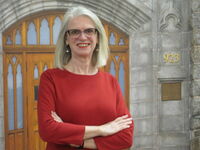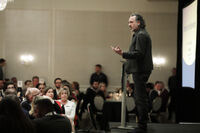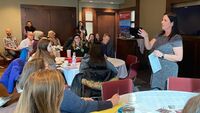By Jordan Whitehouse |
Growing up in Halifax, Burris Devanney dreamed of visiting Africa. “Maybe it was because of the books I’d read, or maybe because I had romantic views of it,” he says. “But that’s not the kind of Africa I ended up going to.”
The Africa this young teacher visited in 1965 was one where people were struggling under warfare and tyrannical leaderships in many countries across the continent. In Rhodesia (now Zimbabwe), for instance, where Devanney and his wife Louanne first landed to teach in a remote secondary school, white supremacist Ian Smith came to power, beginning a 15-year long racial conflict. Later, in 1967, they relocated to an all-boys boarding school in Nigeria where soon the brutal Nigeria-Biafra civil war broke out and the couple had to escape on an evacuation plane out of the region. The story of these two years is told in Devanney’s memoir, African Chronicles.
It was understandable that Devanney stopped thinking of Africa in romantic terms, and it would have made sense if he never wanted to visit the continent again. But that’s not what happened. He went back again and again in the course of a career in development work spanning 52 years and seven African countries. Among a long list of accolades for his development work in Africa, including the Order of The Gambia in 2000, he was given an honorary doctorate from Saint Mary’s in 2004 to go along with the BA he had earned from the University in 1959.
“When we left Biafra on that evacuation plane in ’67, we felt guilty for leaving,” he says. “It tore us apart to see how many children were dying of hunger, and how the region was suffering. Every battle was in a place that we knew.”
It took Devanney 14 years to get back to Africa. In between, he resumed his teaching career at St. Pat’s and later Halifax West high schools, and he and Louanne began their family. But as their children were growing, he always told them that one day they’d all go to live in Africa.
They did just that between 1982 and ’84, after Devanney snagged a job in Gambia helping to develop the first technical institute in the country. The work and the country had such a positive impact on him that when he returned to Halifax West he knew he wanted to share Gambia with more Canadians.
So, with Louanne’s support, he organized a few development-focussed trips to Gambia for students and teachers. Some of those teachers came back so inspired that they and the Devanneys formed the Nova Scotia – Gambia Association (NSGA) in 1989 so that they could work on more significant development projects in the region. Devanney led the NGO for the next 17 years.
The NSGA’s first big project saw a group of 16 Gambian students visit Nova Scotia for a comprehensive six-week training program on peer health education. Thirty-two students from four high schools in Nova Scotia also took part. The idea was to teach these teens how to talk to their peers in both Gambia and Nova Scotia about everything from drug abuse to sexually transmitted diseases to reproductive health. “Unlike here in Canada where we talk about peer pressure in a negative way, in Africa the peer group is hugely influential in a positive way,” says Devanney. “So we found that in the schools in Gambia, the program worked really well.”
Peer education remains a pillar of the NSGA today. Devanney estimates that over the past two decades, the NSGA has trained and maintained teams of 20 or more peer health educators in most of Gambia's more than 160 secondary schools. For several years, commencing in 2002, the NSGA also ran a parallel program in about 100 schools in Sierra Leone, with the two programs employing about 100 Africans.
Yet, as successful as the NSGA was during Devanney’s time as Executive Director, there was one university-sized absence in Gambia that bugged him. “Almost from the time I began working full-time in Gambia, young people would always be coming up and saying to me, ‘Gambia has no university, so how can I go to university in Canada?’” Devanney grew tired of telling them that unless their parents were wealthy, it probably wouldn’t happen. “And the more I thought about it, the more I thought that if Gambians can’t go to a Canadian university, maybe a Canadian university can come to Gambia.”
Long story short, in 1995 he helped convince Saint Mary’s to establish the University Extension Program (UEP), which sent professors to Gambia and hired qualified Gambians to teach university-level courses. Four years later, the UEP’s first 62 students were graduating with degrees in everything from geography to economics. Altogether about 300 African students earned a Saint Mary's degree through the UEP, and another 100 transferred their SMU credits to the new University of The Gambia, which opened in 2000.
Devanney is proud that among the SMU grads who worked in Gambia were his daughter Sara who taught English in an NSGA summer school in 1994, and his son Matthew who taught history in the UEP.
Devanney retired from the NSGA in 2006, but continues to return to Africa, most recently with teachers' unions in Ghana and Uganda setting up community self-development programs in over 60 communities in the two countries.
Looking back on his career, Devanney’s answer to what’s been most meaningful isn’t surprising. “It’s that these programs are now being run by people from these countries and that they’re helping their own people.”
Yet again his own boyhood dreams of Africa didn’t come true — and he’s just fine with that. “It isn’t about me, this isn’t my achievement,” he says. “This is the achievement of all of these people, all of the Canadians who volunteered with us over the years, and of so many people from Gambia and Sierra Leone and beyond who worked with us and have gone on to do bigger, better things.”




